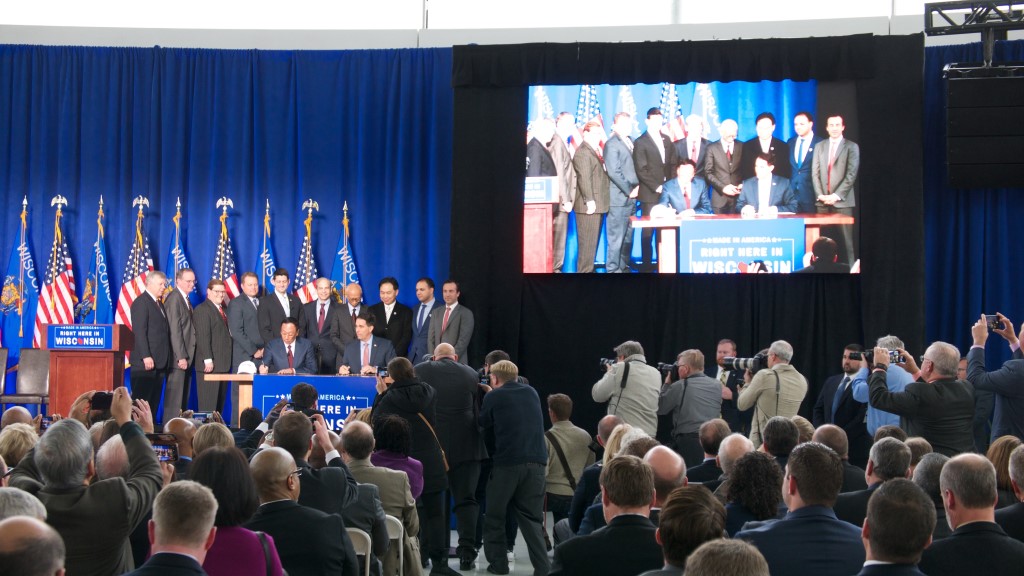Foxconn Contract Has Huge Loophole?
“Ironclad” contract may allow company to count seasonal employees for tax credits.
In December Foxconn Vice Chairman Jay Lee told the Milwaukee Journal Sentinel that the company would have more than the required 520 employees hired to qualify for state tax credits. “The end of December we’ll have a number well beyond what we’re supposed to,” he told the newspaper.
That was a surprise to close observers of the company, who had seen few signs of much happening or many workers at the company’s Racine County campus. But nine days after Lee’s prediction, Foxconn Aerials, the Twitter account that takes overhead photos of the campus, tweeted a photo showing the parking lot for its little-used multi-purpose facility filled with cars. “Have never seen many cars at the multipurpose building since it was built more than a year ago. Until 12/21 when the lot was overflowing,” the Tweet noted.
Could the company be “trying to cram in 520 workers at the end of the year to get a 17% tax-funded kickback on those salaries,” as one observer tweeted in response to the photo. But that wouldn’t get the company much, because the contract awards the employment tax credits on a monthly basis for actual job hours worked.
“In order to earn the maximum amount of Capital Investment Tax Credits,” the contract states, the company must employ the specified number of full-time employees (520 by the end of 2019), but that may include “Partial Year Employees who are employed in Full-Time Jobs as of the end of the period” — by December 31. This same language is repeatedly used in three different paragraphs of the contract.
So the sudden addition of more workers in December at the Mount Pleasant campus would allow the company to collect the capital investment tax credits. And once they were awarded by the state, there is nothing to prevent Foxconn from laying those employees off and then repeating the same process at the end of 2020.
“The plain language of the contract says if they are full-time employees for part of the year, they count for the capital investment tax credits,” says Milwaukee attorney Matt Flynn, who reviewed the contract for Urban Milwaukee. “Then they can yank them in the spring or summer or any time.”
Flynn ran unsuccessfully for governor in 2018 as an avowed opponent of the Foxconn deal. So I reached out to others regarding the contract.
I contacted the Wisconsin Economic Development Corporation and was told flatly by its spokesperson David Callender that this interpretation of the contract was incorrect. In reply I quoted from the relevant sections of the contract showing that partial year employees count toward the required employment and Callender then offered a quite different response.
Wisconsin Assembly Minority Leader, Rep. Gordon Hintz (D-Oshkosh), is a member of the WEDC board and has made his own inquiries about the contract, and is convinced it allows seasonal employment to count for the capital investment tax.
“Clearly this is a loophole,” he charges. “I would like to us to take this issue up at the board.”
I contacted the non-partisan Legislative Fiscal Bureau and Legislative Reference Bureau, and both said they did not offer legal interpretations. I contacted Foxconn, quoting from the contract’s language, and asking if that’s how the company has met, as it claims, the minimum of 520 jobs for this year, and received no response. Should that be the company’s strategy, it would not be the first time it tried to game the system. At the end of 2018 Foxconn claimed it had created the required 260 jobs by December 31, but the WEDC’s review disqualified 40 percent of the jobs, meaning the company got no tax credits.
As repeated questions about problems with the contract have arisen, former Gov. Scott Walker called it an “ironclad contract” in an interview with WISN 12 News.
Assembly Speaker Robin Vos, R-Rochester, used the same phrase: it’s an “ironclad” contract. But when contacted by Urban Milwaukee, quoting from the contract’s language, and asking him to explain why Foxconn can’t claim seasonal employees for the capital expenditures tax credit, he did not respond. Nor did Republican Senate Majority Leader Scott Fitzgerald, also a vociferous supporter of the contract.
Back in 2017, when the Legislature was poised to pass the Foxconn contract, Democrats raised the issue that the company was known for using robots whenever possible. “One of our fears was that the company would ask for all the capital expenditure credits and not create these jobs,” Hintz says.
He speculates that the flexible language regarding partial year employees was included because “the company was saying the jobs go up and down depending on the market.” Indeed, the contract early on notes that “there are a variety of factors that impact employment and average wages of Full-Time Employees, including but not limited to labor supply challenges, market conditions and other conditions.”
Hintz ridicules the notion that Foxconn is now employing 520 workers. “There is zero chance there are that many people working for the company. I doubt anyone could explain what that many workers are doing now.”
As recently as last April the technology publication The Verge traveled to every place where the company claims to have operations: Mount Pleasant, Milwaukee, Eau Claire, Green Bay and Wisconsin, and found mostly empty buildings with a handful of employees.
The Gen 6 plant Foxconn now claims to be building — though there are big reasons to doubt this — won’t be operational until 2022, the company has said. While the new facility it is building is supposed to open this May, Foxconn has repeatedly changed its explanation of what will be done there, from coffee making kiosks for airports to a high-performance computing data center. Meanwhile what are those 520 workers it claims to have hired last year doing and where are they working?
“The project that they have right now is outside the bounds of the contract,” Wisconsin Department of Administration Secretary Joel Brennan told The Verge in December. Since May 2019, nearly a year ago, Foxconn has been “continuously encouraged” to revise the contract, Brennan noted, but has yet to show any willingness to do so.
Instead, they went to the Journal Sentinel with the announcement that they have hired the required number of employees, putting pressure on the WEDC and Gov. Tony Evers to decline to give the tax credits, with the hope that Republicans like Vos will defend Foxconn.
Some of those 520 employees may also be doing work for Foxconn outside Wisconsin. A Legislative Audit Bureau report has noted that the current contract allows the company to count these employees for the state tax credit.
In short, this “ironclad” contract is outdated and has huge loopholes that make it easy for the company to game the system. To protect the taxpayers interest the WEDC and the Legislature both need to demand a revised contract.
If you think stories like this are important, become a member of Urban Milwaukee and help support real, independent journalism. Plus you get some cool added benefits.
More about the Foxconn Facility
- Foxconn Paid Mount Pleasant $15 Million Make-Up Fee in 2025 - Steph Conquest-Ware - Jan 6th, 2026
- Murphy’s Law: Total Cost of Foxconn Is Rising - Bruce Murphy - Dec 8th, 2025
- WEDC, Foxconn announce additional $569 million investment in Racine County - Wisconsin Economic Development Corporation - Nov 25th, 2025
- Foxconn Acquires 20 More Acres in Mount Pleasant, But For What? - Joe Schulz - Jan 7th, 2025
- Murphy’s Law: What Are Foxconn’s Employees Doing? - Bruce Murphy - Dec 17th, 2024
- With 1,114 Employees, Foxconn Earns $9 Million in Tax Credits - Joe Schulz - Dec 13th, 2024
- Mount Pleasant, Racine in Legal Battle Over Water After Foxconn Failure - Evan Casey - Sep 18th, 2024
- Biden Hails ‘Transformative’ Microsoft Project in Mount Pleasant - Sophie Bolich - May 8th, 2024
- Microsoft’s Wisconsin Data Center Now A $3.3 Billion Project - Jeramey Jannene - May 8th, 2024
- We Energies Will Spend $335 Million on Microsoft Development - Evan Casey - Mar 6th, 2024
Read more about Foxconn Facility here
Murphy's Law
-
Top Health Care Exec Paid $25.7 Million
 Dec 16th, 2025 by Bruce Murphy
Dec 16th, 2025 by Bruce Murphy
-
Milwaukee Mayor’s Power in Decline?
 Dec 10th, 2025 by Bruce Murphy
Dec 10th, 2025 by Bruce Murphy
-
Total Cost of Foxconn Is Rising
 Dec 8th, 2025 by Bruce Murphy
Dec 8th, 2025 by Bruce Murphy






















Thanks to Bruce Murphy for this factual and hard – hitting article. Calling those who willingly and unquestionably provide Taxpayer Funded Corporate Welfare to account takes a lot of research and Cajones. You have done an admirable job.
Thanks again for the questioning and hard hitting articles written by Bruce Murphy. Urban Milwaukee is a Leader in uncovering the stories which are important to Wisconsin Residents.